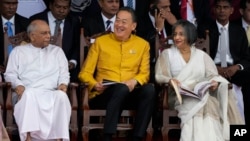Thai Prime Minister Srettha Thavisin was the guest of honor at Sri Lanka’s 76th Independence Day celebrations Sunday, as the island nation struggles to emerge from its worst economic crisis.
Srettha joined Sri Lankan President Ranil Wickremesinghe at a low-key ceremony near the country’s main seaside esplanade that included a military parade and parachute jumps. The holiday commemorates Sri Lanka's independence from British rule in 1948.
Sri Lanka declared bankruptcy in April 2022 with more than $83 billion in debt, more than half of it to foreign creditors. The economic upheaval led to a political crisis that forced then-President Gotabaya Rajapaksa to resign in 2022. The parliament then elected Wickremesinghe as president.
Srettha arrived in Sri Lanka on Saturday and the two countries signed a free trade agreement aiming to boost trade and investment.
Wickremesinghe said Saturday that Sri Lanka has made significant progress in economic stabilization and sought the help of Thailand in efforts to transform the battered economy and regain international confidence.
Sri Lanka suspended repayment of its debt in 2022 as it ran short of foreign currency needed to pay for imports of fuel and other essentials. Shortages led to street protests that changed the country’s leadership. The International Monetary Fund approved a four-year bailout program last March.
The economic situation has improved under Wickremesinghe, and severe shortages of food, fuel and medicine have largely abated. But public dissatisfaction has grown over the government’s effort to increase revenue by raising electricity bills and imposing heavy new income taxes on professionals and businesses, as part of the government’s efforts to meet the IMF conditions.
Sri Lanka is hoping to restructure $17 billion of its outstanding debt and has already reached agreements with some of its external creditors.




